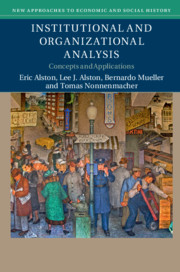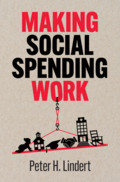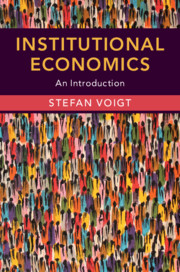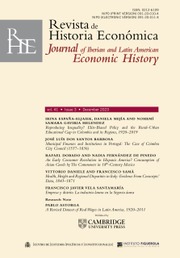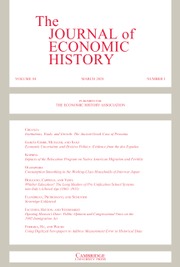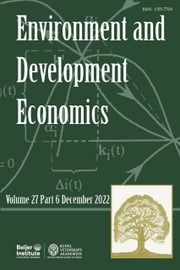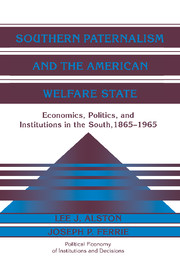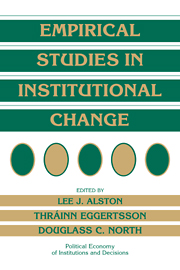Institutional and Organizational Analysis
Concepts and Applications
Part of New Approaches to Economic and Social History
- Authors:
- Eric Alston, University of Colorado Boulder
- Lee J. Alston, NBER
- Bernardo Mueller, University of Brasilia
- Tomas Nonnenmacher, Allegheny College, Pennsylvania
- Date Published: October 2018
- availability: Available
- format: Paperback
- isbn: 9781107451254
Paperback
-
What explains the great variability in economic growth and political development across countries? Institutional and organizational analysis has developed since the 1970s into a powerful toolkit, which argues that institutions and norms rather than geography, culture, or technology are the primary causes of sustainable development. Institutions are rules that recognized authorities create and enforce. Norms are rules created by long-standing patterns of behavior, shared by people in a society or organization. They combine to play a role in all organizations, including governments, firms, churches, universities, gangs, and even families. This introduction to the concepts and applications of institutional and organizational analysis uses economic history, economics, law, and political science to inform its theoretical framework. Institutional and organizational analysis becomes the basis to show why the economic and political performance of countries worldwide have not converged, and reveals the lessons to be learned from it for business, law, and public policy.
Read more- Provides a toolkit for, and systemic overview of, institutional analysis
- Analyzes institutions and institution-making in many types of organizations, including families, firms, and governments
- Combines economics, economic history, law, and political science, while laying out the concepts of institutional analysis in an orderly fashion that is rigorous without being mathematical
Reviews & endorsements
'These four intrepid authors develop a theory of institutional and organizational analysis of enormous ambition. Influenced by Buchanan, Coase, North and Ostrom, and Williamson, they work on a broad tapestry that crosses continents, spans centuries, and yet always maintains its focus on which set of arrangements flourish and which flounder.' Richard A. Epstein, New York University, The Hoover Institution and University of Chicago
See more reviews'As a rule you can only synthesize an academic field when it is moribund. This book is the exception that proves the rule; it manages to bring together the most important ideas in institutional economics in a way which not only shows how intellectually vibrant it is, but which also opens up new research agendas. There is no better introduction.' James A. Robinson, University of Chicago
'This comprehensive introduction to the study of institutions and organizations approaches the question I have long considered in my own work: which set of institutions are most conducive to economic development? These authors provide an excellent synthesis of this essential field of study for students and scholars alike.' Hernando de Soto, Institute for Liberty and Democracy
'This is the book we've been waiting for - a comprehensive, comparative, interdisciplinary tour of the key concepts and most significant arguments that define modern political economy. The authors have assembled a remarkable volume of scope and content. It belongs on every scholar's shelf and in every student's hands.' Kenneth A. Shepsle, Harvard University
'This is a wonderful book - broad in scope (institutions, norms, organizations, and contracts), in disciplines (economics, political science, law, and history), and in methodologies (classic informal arguments, summaries of recent formal models, and incisive case studies). So many problems of collective action, productivity, development, and growth find almost no expression (not to mention solution) in neoclassical analyses of markets; Institutional and Organizational Analysis offers a way forward.' Robert Gibbons, Sloan School of Management, Massachusetts Institute of Technology
Customer reviews
Not yet reviewed
Be the first to review
Review was not posted due to profanity
×Product details
- Date Published: October 2018
- format: Paperback
- isbn: 9781107451254
- length: 406 pages
- dimensions: 228 x 153 x 21 mm
- weight: 0.55kg
- contains: 19 b/w illus.
- availability: Available
Table of Contents
Introduction
Part I. From Institutions to Economic Outcomes:
1. Institutions and property rights
2. Property rights and transaction costs
3. Organizations and contracts
Part II. From Economic Outcomes to Political Performance:
4. Special interests and citizens
5. The legislature and executive
6. Bureaucracies
7. The judicial system
Part III. The Dynamics of Economic and Political Development:
8. Developmental trajectories: institutional deepening and critical transitions
9. Case studies of critical transitions: Argentina, Brazil, Ecuador, and the United States
Conclusion.
Sorry, this resource is locked
Please register or sign in to request access. If you are having problems accessing these resources please email [email protected]
Register Sign in» Proceed
You are now leaving the Cambridge University Press website. Your eBook purchase and download will be completed by our partner www.ebooks.com. Please see the permission section of the www.ebooks.com catalogue page for details of the print & copy limits on our eBooks.
Continue ×Are you sure you want to delete your account?
This cannot be undone.
Thank you for your feedback which will help us improve our service.
If you requested a response, we will make sure to get back to you shortly.
×
